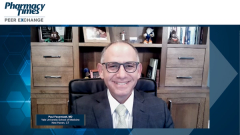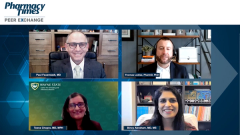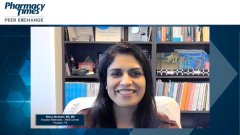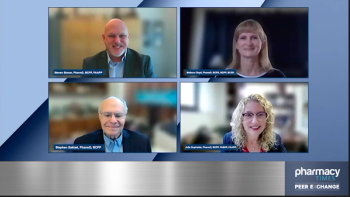
Unmet Needs in Management of C. Difficile Infection (CDI)
Bincy Abraham, MD, MS; Thomas Lodise, PharmD, PhD; Teena Chopra, MD, MPH; and Paul Feuerstadt, MD, share unmet needs, including access to therapies, in treatment of C. difficile infection (CDI).
Episodes in this series

Paul Feuerstadt, MD: As we shift gears to the last section, I think it’s important for all of us to have an opportunity to express what areas we think are most important; what unmet needs and prevention, diagnosis, treatment, and management are most important to you. Tom, why don’t you kick us off?
Thomas Lodise, PharmD, PhD: Well, it’s an exciting time. First and foremost, I think with FMT [fecal microbiota transplantation], with all the concerns, you read the reports about people getting ESBL [extended spectrum beta-lactamase] infections, the lack of standardization. These biotherapeutics are clearly a step forward. I was joking around calling them “next generation FMT,” but really, they’re standalone products and have very unique properties, many of which as Bincy indicated are proprietary. When I think about moving forward, we actually had this in the gram-negative space. Teena attested this. We went from co-listing to a bunch of agents. Now the question is, where do we place them? In a situation like this, I always say, “Well, who’s the patient?” We’re in the VA, we tend to be more conservative. We’ll look at people with 3 or more episodes, 2 recurrences, perhaps an individual with one recurrence that had a severe recurrence. In that population, Paul, there’s a lot of questions that remain. You mentioned the one thing is these biotherapeutics better prolonged extended taper doses of fidaxomicin. You talked about that one experience you saw that one site where people are getting at 40 plus days. Someone gets fidaxomicin, and then they get bezlotoxumab. Should we give one of these biotherapeutics in the individual? My thought is after the first recurrent to give bezlotoxumab guidelines supportive or thinking about at least our clinical trial data supports that. Then with 2 or more recurrences, we start thinking about these biotherapeutics. Even in that circumstance, head-to-head with these biotherapeutics versus fidaxomicin and bezlotoxumab preferably in an extended post dose type of regimen. We have new agents; they’ll be used they’ll be high priority. I always like to see what the publications bring forth and particularly the FDA labeling. They get a different dataset than what’s sometimes in the paper. That’s the patient population and we’re to consider them. At the same time, I don’t want to be that clinician that ask for another randomized clinical trial. We will prioritize their use. My thought is perhaps if you think about as bezlotoxumab a bit earlier in the course. Then those with 2 or more recurrences, 3 or more episodes, we’re going to start thinking about these new biotherapeutics that will hopefully soon be available.
Paul Feuerstadt, MD: Bincy, do you have any thoughts on unmet needs and prevention, diagnosis, treatment, and management?
Bincy Abraham, MD, MS: Yes. I know we talked a lot about science and data and new products, but I’m thinking from the patient’s perspective that we have to really control their symptoms early and improve their quality of life, got to get them on whichever treatment as early as possible, so that we can prevent the complications, the hospitalizations, and prevent this recurrence of their disease as well. But with new products coming out in the future, I think accessibility is going to be very important because we can have many of these FDA approved, but, if the patients can get to it or we can prescribe it or can be covered by insurance, what’s the point? I think accessibility is going to be very key for the future to get our patients healed up, treated, under control, in remission, as I would like to say, without having recurrence of the infections.
Paul Feuerstadt, MD: Excellent. Teena, what are your thoughts?
Teena Chopra, MD, MPH: Like everyone said, I think the most important thing is to have a consistent way of giving these live biotherapeutics. It is FDA approved; people can have easy access to it. I love the way Bincy pointed out the quality of life. I think it goes without saying how recurrent C. diff affects the patient’s quality of life; their emotional, mental, psychological abilities to perform day-to-day activities. It is majorly hindered. These products can really break that chain of the vicious cycle of dysbiosis, that’s what I’m most excited about.
Paul Feuerstadt, MD: Excellent. We’re really seeing that we’re on the precipice of something special, which is hopefully an FDA approval of 1 of these live biotherapeutic products, which will be really a game changer, because the accessibility now is really a specialty centers. But hopefully, with an FDA approval, it will be much more available. People will be more comfortable using them, because there’s going to be hopefully phase 2, phase 3 data to support the usage in terms of consistent safety and efficacy profiles. Once you get that stamp, more people will be comfortable intervening, more people will understand better. Most importantly, our patients will feel a lot better; they will hopefully have that cycle broken earlier.
Transcripts edited for clarity
Newsletter
Stay informed on drug updates, treatment guidelines, and pharmacy practice trends—subscribe to Pharmacy Times for weekly clinical insights.




























